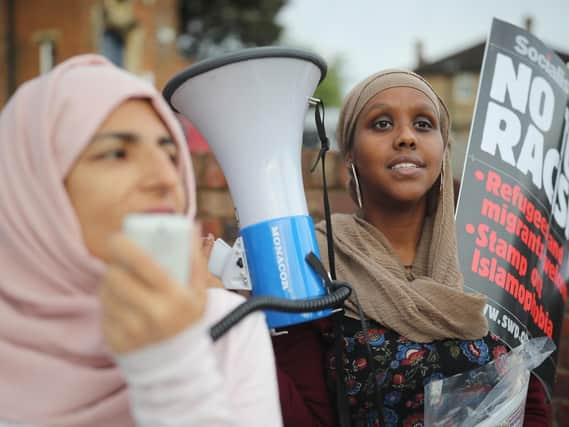Scotland takes world-leading step to tackle Islamophobia – Anas Sarwar MSP


Nearly two years ago, I decided to speak out about my own experiences of racism and Islamophobia and the impact on my family.
It was one of the hardest things I’ve done.
But the countless stories of other people’s experiences which I heard in the weeks that followed only strengthened my resolve.
Advertisement
Hide AdAdvertisement
Hide AdAt the Scottish Parliament, I launched the Cross Party Group on Tackling Islamophobia, which has since become the largest CPG at Holyrood.
This is much bigger than one institution or party, and we must work together if we are to challenge everyday racism and Islamophobia.
The CPG identified five workstreams: hate crimes; education; employment; women; and the media.
We are fortunate in Scotland to have a vibrant media industry that has produced world-leading journalistic talent.
Bias breeds distrust
But one thing struck me when I set out to address the prejudice and hatred towards Muslim communities: who people blame for the rising divisions in society. Rightly or wrongly, they blame politicians and the media.
Poorly researched articles, negative comments about Islam, or unconscious bias from writers have led to a considerable distrust of the media within the Muslim community.
The CPG set out to address these issues, and we invited newspaper and TV editors to address the group in the first roundtable event of its kind.
We agreed a series of action points including newsroom visits, proposals to increase diversity in the media, and the production of media guidelines for journalists.
Advertisement
Hide AdAdvertisement
Hide AdI am passionate about a free and prosperous media industry. In an era of fake news and disinformation, the role of media professionals has never been more important – regardless of how uncomfortable that might be for politicians.
I would like to thank all the journalists and editors for their positive engagement during this process.
The media won’t always get it right, but open dialogue and engagement will make a dramatic difference.
As part of the process of producing new media guidelines, we held a number of focus groups with young Muslims, Muslim women, individuals and organisations who belong to the CPG, non-Muslims, and senior journalists from print and broadcast media.
World first
The result is an extensive new report authored by former BBC TV producer Uzma Mir and Professor Peter Hopkins of Newcastle University – in conjunction with the National Union of Journalists and Newcastle University.
We have also produced a two-page summary document of the guidelines, which will be shared with journalists and media organisations across Scotland.
These guidelines are thought to be a world’s first and will demonstrate leadership from Scotland to the rest of the UK and internationally.
I hope the document becomes a regularly used tool and acts as a quick guide for the media.
Advertisement
Hide AdAdvertisement
Hide AdHow Islam and Muslims are reported on across diverse forms of media is important, as this sets the narratives through which readers, listeners and viewers understand the world.
The media has significant power in shaping how Islam and Muslims are represented and therefore the extent to which Muslims experience everyday racism and Islamophobia.
In most polls and from the CPG’s own work with focus groups, many Muslims felt that there was an issue with Islamophobia and that the media played a major part in its rise.
We all want and cherish a free press, but irresponsible or badly researched journalism can quickly become fuel for hatred.
Whitewashing a mass killer
One UK newspaper described Christchurch terror perpetrator Brenton Tarrant as an "angelic boy who grew into an evil far-right mass killer", sending angry shockwaves throughout the Muslim community, who saw this as an attempt to humanise the killer and ‘whitewash’ the incident.
The headline was subsequently changed, but inevitably, some damage had been done.
Another tabloid this year ran the headline “Thousands sign petition to save Brit doctor who asked Muslim to remove veil.”
There was no reference to say whether the woman was British herself, but the fact that the Britishness of the doctor was pointed out is an example of a ‘them and us’ scenario.
Advertisement
Hide AdAdvertisement
Hide AdFocus group members also pointed out that the terms ‘hijab', ‘niqab and ‘burka’ seemed to be used interchangeably, without much regard for accuracy, while there is widespread misuse of the word ‘jihad’.
But it is important to acknowledge there is a strong desire within the media to change the way that Muslims and Islam are reported.
Broadcasters and newspaper editors are beginning to understand that Islamophobia is an issue in society and there is a need to challenge it.
The CPG has built a healthy relationship with the media in Scotland, and we commend the hard work of journalists in this vital industry.
But while progress is being made, it is worth noting that all the hard work being done to improve the way Islam and Muslims are reported, which is building trust between our diverse communities and the media industry, could be undermined by individual cases that create the impression of an inconsistency or an ‘us’ versus ‘them’ approach.
The fight for equality in all its forms won’t be won by itself with time, it will require more hard work, and it will require greater dedication.
By coming together to challenge all forms of prejudice we can build the tolerant and inclusive society we aspire to be. This is a fight for all of us.
Anas Sarwar MSP is chair of the Cross Party Group on Tackling Islamophobia
